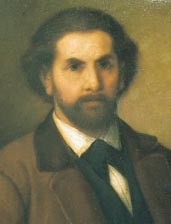| Revision as of 22:59, 30 April 2021 editWw2censor (talk | contribs)Autopatrolled, Extended confirmed users, Pending changes reviewers107,953 editsm refine & add image← Previous edit | Revision as of 12:29, 1 May 2021 edit undoAngryHarpy (talk | contribs)Extended confirmed users, Rollbackers36,094 edits Setting DEFAULTSORT key to Sage, Jules Auguste using Hot Default SortNext edit → | ||
| Line 42: | Line 42: | ||
| {{Authority control|BNF=cb10511725r}} | {{Authority control|BNF=cb10511725r}} | ||
| {{DEFAULTSORT:Sage, Jules Auguste}} | |||
| ] | ] | ||
| ] | ] | ||
Revision as of 12:29, 1 May 2021
| Jules Auguste Sage | |
|---|---|
 | |
| Born | (1829-03-16)March 16, 1829 Paris |
| Died | October 13, 1908(1908-10-13) (aged 79) Paris |
| Nationality | French |
| Occupation(s) | Sculptor, artist |
| Years active | 1870–1901 |
| Notable work | Type Sage postage stamps |
Jules Auguste Sage (Paris, 16 March 1829 - Paris, 13 October 1908) was a French poet, artist and sculptor. He is known for giving his name to a type of French postage stamp, Type Sage, first issued in 1876.
Life

Sage exhibited at the Paris Salons between 1870 and 1901 and became a member of the Société des artistes français in 1883.
Stamps

He designed the Type Sage postage stamps, also referred as the Peace and Commerce issue that the postal administration selected in a competition. The engraving was made by Louis-Eugène Mouchon. These stamps were a replacement for both the Ceres series that had lasted from 1849 to 1851 in different forms, and the Napoleon III stamps. The Type Sage were in use 1876 until 1900 and were the only stamps in use denominated from 1 centimes to 5 francs with intervening denominates of, 2¢, 4¢, 5¢, 10¢, 15¢, 20¢, 25¢, 30¢, 40¢ and 75¢. His name appears, in very small type, in the bottom left corner of the stamps and Mouchon is attributed in the right corner. In 1900 they were replaced by the Type Blanc, named after their designer Paul Joseph Blanc.
Publications
- Les Destinées de l'homme, esquisse, éd. Édouard Dentu, 1887.
- Poésies diverses, éd. Édouard Dentu, 1895.
Notes
- Sage's birth and death dates are listed as 1840–1910 in this source
References
- Acte de décès (avec date et lieu de naissance) à Paris, vue 10/31.
- ^ "Sage Jules-Auguste". Stamp designers and engravers (in French). Philatelie Francaise. 2021. Retrieved 30 April 2021.
- "Notice Artiste n° 21433: Auguste Jules Sage". Musée d'Orsay. 2020. Retrieved 30 April 2021.
- "French Stamps: Issues of 1876-1900: Type Sage". www.stamp-collecting-world.com. 2021. Retrieved 30 April 2021.
- "Because of stamps, the Roman god Mercury really gets around". Insights. Linns Stamp News. 24 August 2014. Retrieved 30 April 2021.
- "French Stamps - Issues of 1900-1929". www.stamp-collecting-world.com. Retrieved 2021-04-30.
External links
Categories: